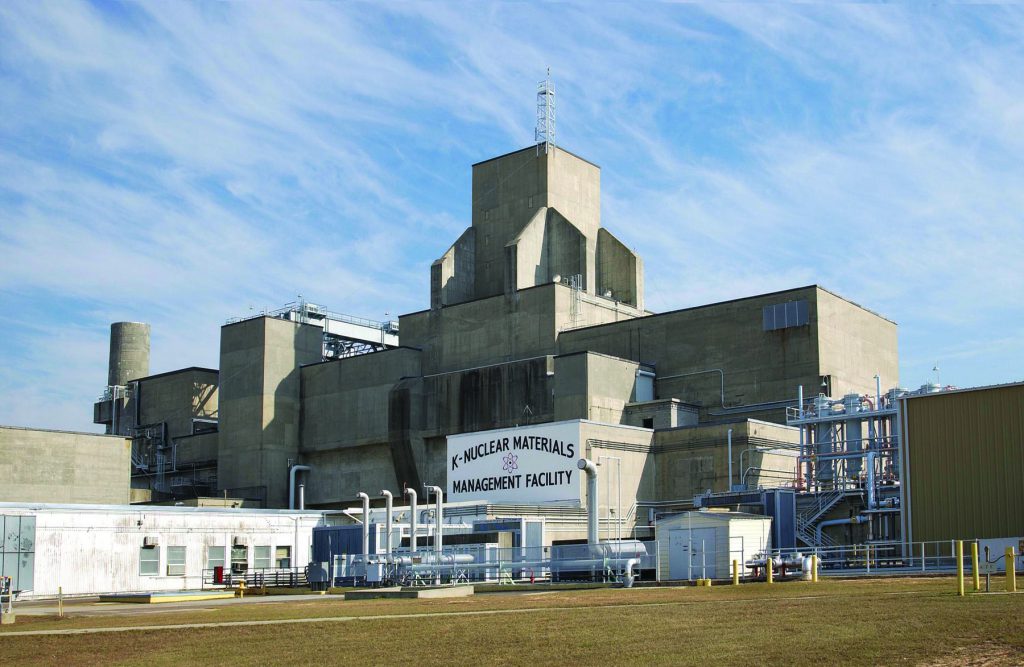“A former Democratic state legislator, Sellers said that from his experience, he knows if the $600 million — or however much money there is — goes into the general fund, the money will not be spent on the counties impacted by the storage of plutonium.”
BY: JOHN MONK | thestate.com

Credit SAVANNAH RIVER SITE / SRS.GOV
BARNWELL, SC – A state circuit judge on Wednesday issued a temporary injunction freezing $600 million in federal funds that came to South Carolina as a result of a political settlement in a long-running dispute over what to do with some 11 tons of deadly plutonium now stored at the Savannah River Site in Barnwell County.
Judge Clifton Newman issued the injunction against State Attorney General Alan Wilson shortly before noon Wednesday in response to a motion by State Sen. Brad Hutto, D-Orangeburg, who represents Barnwell County, Allendale County and five other counties in the area.
Newman’s injunction, issued from the bench in a Barnwell County courtroom, is temporary and within a month he is expected to hold another hearing that will fully air differing sides on what to do with the $600 million.
“All federal funds received by the state must be appropriated by the state in accordance with the federal purpose for which it was intended,” Hutto told the judge. Since the funds in the settlement were given by the federal government as compensation for the plutonium stored in their geographic area, they should generally be spent there in those impacted counties along the state’s southwestern boundary, Hutto argued.
It is essential that the “identity” of the federal funds be preserved before Wilson routes the money into the state’s general fund, where other lawmakers might seek to spend it for purposes outside those South Carolina counties Hutto represents, Hutto told the judge.
“We don’t want the funds disbursed or commingled,” Hutto told the judge, saying that the General Assembly might decide to spend money on beach renourishment or a practice facility for the Carolina Panthers football team, and that would not be right, Hutto said.
Those South Carolina counties are due much or all of the $600 million in compensation for economic and other losses they have endured for having the Savannah River Site be the storehouse of the weapons grade plutonium, a substance so toxic and deadly that having it stored in the area — just eight miles from downtown Barnwell — repels businesses that might want to locate in the area, Hutto said.
Hutto was opposed by a top assistant attorney general, J. Emory Smith Jr., who argued to Newman that even though the South Carolina counties who brought the suit might be deserving of the money, the law requires it to go into a general fund controlled by the state Legislature.
“The funds are clearly controlled by the General Assembly,” Smith told the judge. “It is up to the House and the Senate to determine how this money should be spent” and “the Attorney General lacks authority to tell the Legislature what to do about this.”
Moreover, Smith told the judge, as a matter of law, Hutto is not likely to win his case on where the money should be spent, so an injunction is not warranted.
On Aug. 31, the $600 million settlement was announced by State Attorney General Alan Wilson. At that time, Wilson also said two private law firms he hired to work on the case were going to get a $75 million legal fee under a contract that the attorneys had with his office.
At Wednesday’s hearing, Smith told Judge Newman that the $75 million in fees “have already been distributed” and, as a result, “what we have at issue here is approximately $525 million.”
However, that $75 million fee is currently in dispute in a separate court action in Richland County.
There, longtime government watchdog John Crangle and a public interest organization, S.C. Public Interest Foundation, have sued Wilson seeking a freeze on the $75 million until a hearing can be held on just exactly those lawyers did to deserve a $75 million fee.
On Tuesday, Judge Debra McCaslin told Crangle’s lawyer, Jim Griffin, that she wanted to hear more legal arguments from him on whether she could prevent the law firms, at least temporarily, from spending the $75 million.
In other remarks to the judge, Hutto said that Gov. Henry McMaster and other officials favor giving the money to western South Carolina. “Everybody’s sort of in agreement where this money is supposed to go,” Hutto said.
Hutto said Attorney General Wilson told the counties during the litigation that led to the settlement that he “would protect their interests” and Wilson should make that position clear to everyone.
Also speaking briefly Wednesday was attorney Bakari Sellers, representing Bamberg County, who told the judge that a lawsuit he just filed on behalf of Bamberg County mirrors Hutto’s lawsuit.
Bamberg might not have as much claim on the money as the counties where the Savannah River Site is, but being a neighboring county, it has some claim, Sellers said.
A former Democratic state legislator, Sellers said that from his experience, he knows if the $600 million — or however much money there is — goes into the general fund, the money will not be spent on the counties impacted by the storage of plutonium.
At hearing’s end, Judge Newman told the courtroom the matter is a complex issue “of great public interest” and the best course is to freeze the money pending a more thorough hearing.
